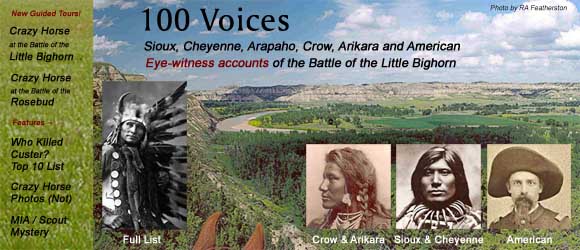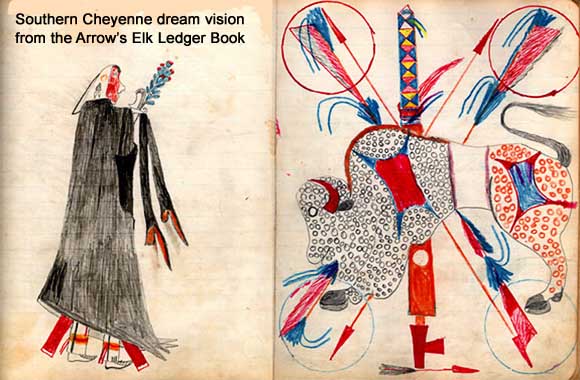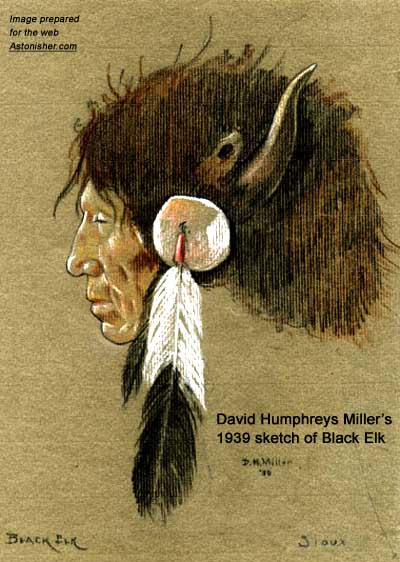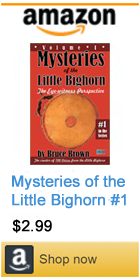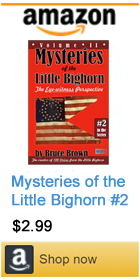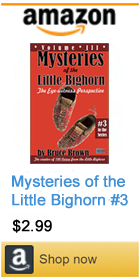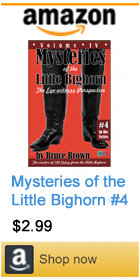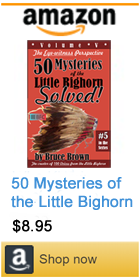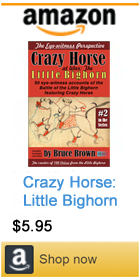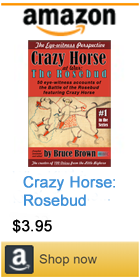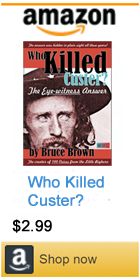|
|||||||
Bruce Brown's 100 Voices... Black Elk Recalls Crazy Horse
AFTERWHILE we came to the village on Powder River and went into camp at the downstream end. I was anxious to see my cousin, Crazy Horse, again, for now that it began to look like bad trouble coming, everybody talked about him more than ever and he seemed greater than before. Also I was getting older. Of course I had seen him now and then ever since I could remember, and had heard stories of the brave things he did. I remember the story of how he and his brother [ Little Hawk] were out alone on horseback, and a big band of Crows attacked them, so that they had to run. And while they were riding hard, with all those Crows after them, Crazy Horse heard his brother call out; and when he looked back, his brother's horse was down and the Crows were almost on him. And they told how Crazy Horse charged back right into the Crows and fought them back with only a bow and arrows, then took his brother up behind him and got away. It was his sacred power that made the Crows afraid of him when he charged. [Note: Both Crazy Horse himself and Short Bull said this famous exploit took place against the Shoshoni.] And the people told stories of when he was a boy and used to be around with the older Hump all the time. Hump was not young any more at the time, and he was a very great warrior, maybe the greatest we ever had until then. They say people used to wonder at the boy and the old man always being together; but I think Hump knew Crazy Horse would be a great man and wanted to teach him everything. Crazy Horse's father was my father's cousin, and there were no chiefs in our family before Crazy Horse; but there were holy men; and he became a chief because of the power he got in a vision when he was a boy. When I was a man, my father told me something about that vision. Of course he did not know all of it; but he said that Crazy Horse dreamed and went into the world where there is nothing but the spirits of all things. That is the real world that is behind this one, and everything we see here is something like a shadow from that world. He was on his horse in that world, and the horse and himself on it and the trees and the grass and the stones and everything were made of spirit, and nothing was hard, and everything seemed to float. His horse was standing still there, and yet it danced around like a horse made only of shadow, and that is how he got his name, which does not mean that his horse was crazy or wild, but that in his vision it danced around in that queer way. It was this vision that gave him his great power, for when he went into a fight, he had only to think of that world to be in it again, so that he could go through anything and not be hurt. Until he was murdered by the Wasichus at the Soldiers' Town on White River, he was wounded only twice, once by accident and both times by some one of his own people when he was not expecting trouble and was not thinking; never by an enemy. He was fifteen years old when he was wounded by accident; and the other time was when he was a young man and another man was jealous of him because the man's wife liked Crazy Horse. They used to say too that he carried a sacred stone with him, like one he had seen in some vision, and that when he was in danger, the stone always got very heavy and protected him somehow. That, they used to say, was the reason no horse he ever rode lasted very long. I do not know about this; maybe people only thought it; but it is a fact that he never kept one horse long. They wore out. I think it was only the power of his great vision that made him great.
One day after we had camped there on Powder River, I went upstream to see him again, but his tepee was empty and he was gone somewhere, maybe with a war-party against the Crows, for we were close to them now and had to look out for them all the time. Later I did see him. He put his arm across my shoulder and took me into his tepee and we sat down together. I do not remember what he said, but I know he did not say much, and he did not tease me. Maybe he was thinking about the trouble coming. We did not stay together there very long, but scattered out and camped in different places so that the people and the ponies would all have plenty. Crazy Horse kept his village on Powder River with about a hundred tepees, and our band made camp on the Tongue. We built a corral of poles for the horses at night and herded them all day, because the Crows were great horse-thieves and we had to be careful. The women chopped and stripped cottonwood trees during the day and gave the bark to the horses at night. The horses liked it and it made them sleek and fat. Beside the mouth of the corral there was a tepee for the horse guard, and one night Crow Nose was staying there and his wife was with him. He had a hole in the tepee so that he could look through. Afterwhile he got very sleepy, so he woke his wife and told her to get up and watch while he had a little rest. By and by she saw something dark moving slowly on the snow out there, so she woke her husband and whispered, "Old man, you'd better get up, for I think I see something." So Crow Nose got up and peeped out and saw a man moving around the corral in the starlight looking for the best horse. Crow Nose told his wife to keep her eye at the hole and let him know when the man was coming out with a horse, and he lay down at the opening of the tepee with the muzzle of his gun sticking out of the flap. By and by they could hear the bar lifted at the mouth of the corral. When his wife touched him, Crow Nose thrust his head outside and saw the man just getting on a horse to ride away. He was black against the sky, so Crow Nose shot him, and the shot woke the whole camp so that many came running with guns and coup sticks. Yellow Shirt was the first to count coup on the dead Crow, but many followed. A man who has killed an enemy must not touch him, for he has already had the honor of killing. He must let another count coup. When I got there to see, a pile of coup sticks was lying beside the Crow and the women had cut him up with axes and scattered him around. It was horrible. Then the people built a fire right there beside the Crow and we had a kill dance. Men, women, and children danced right in the middle of the night, and they sang songs about Crow Nose who had killed and Yellow Shirt who had counted the first coup. Then it was daylight, and the crier told us we would move camp to the place where Root-of-the-Tail died. Crow Nose dressed up for war, painted his face black and rode the horse the enemy had tried to steal. When the men paint their faces black, the women all rejoice and make the tremolo, because it means their men are going to kill enemies. When we camped again, one of Red Cloud's loafers who had started back for the Soldiers' Town because they were afraid there might be trouble, came in and said the Crows had killed all his party but himself, while they were sleeping, and he had escaped because he was out scouting. During the winter, runners came from the Wasichus and told us we must come into the Soldiers' Town right away or there would be bad trouble. But it was foolish to say that, because it was very cold and many of our people and ponies would have died in the snow. Also, we were in our own country and were doing no harm. Late in the Moon of the Dark Red Calves (February) there was a big thaw, and our little band started for the Soldiers' Town, but it was very cold again before we got there. Crazy Horse stayed with about a hundred tepees on Powder, and in the middle of the Moon of the Snowblind (March) something bad happened there. It was just daybreak. There was a blizzard and it was very cold. The people were sleeping. Suddenly there were many shots and horses galloping through the village. It was the cavalry of the Wasichus, and they were yelling and shooting and riding their horses against the tepees. All the people rushed out and ran, because they were not awake yet and they were frightened. The soldiers killed as many women and children and men as they could while the people were running toward a bluff. Then they set fire to some of the tepees and knocked the others down. But when the people were on the side of the bluff, Crazy Horse said something, and all the warriors began singing the death song and charged back upon the soldiers; and the soldiers ran, driving many of the people's ponies ahead of them. Crazy Horse followed them all that day with a band of warriors, and that night he took all the stolen ponies away from them, and some of their own horses, and brought them all back to the village. These people were in their own country and were doing no harm. They only wanted to be let alone. We did not hear of this until quite awhile afterward; but at the Soldiers' Town we heard enough to make us paint our faces black. Black Elk Speaks: The Life Story of a Holy Man of the Ogalala Sioux, by John G. Neihardt (Flaming Rainbow), p 64 - 68
Black Elk was Crazy Horse's cousin. Although Black Elk was only 13, he took two scalps in the Battle of the Little Bighorn. Black Elk surrendered with Crazy Horse's band at Ft. Robinson in May 1877. |
|||||||



